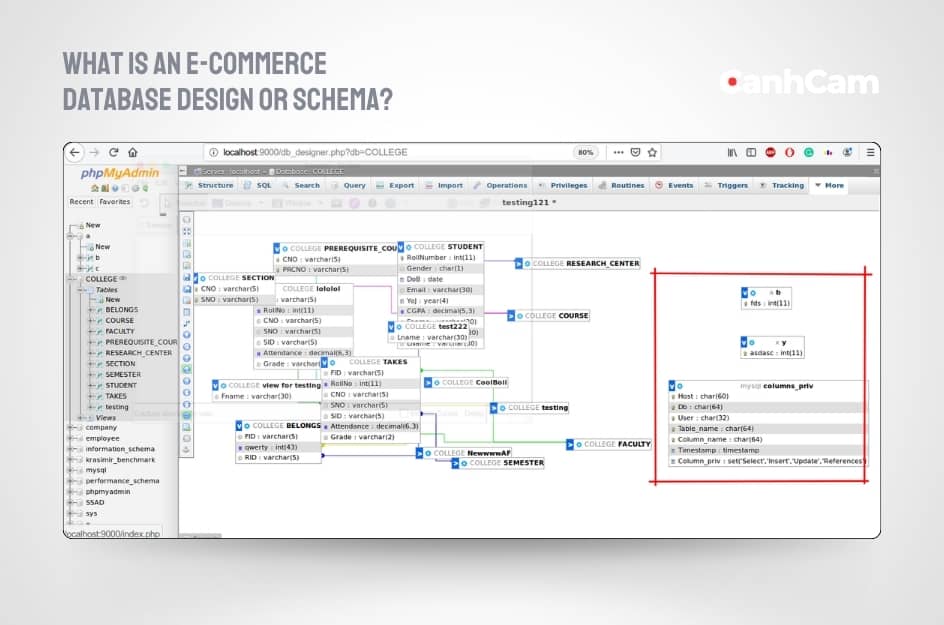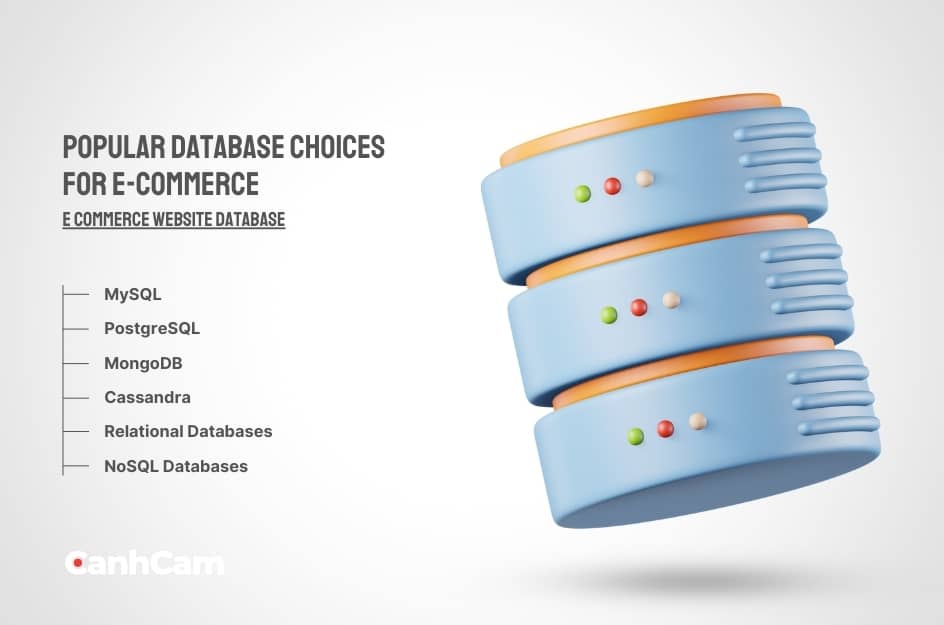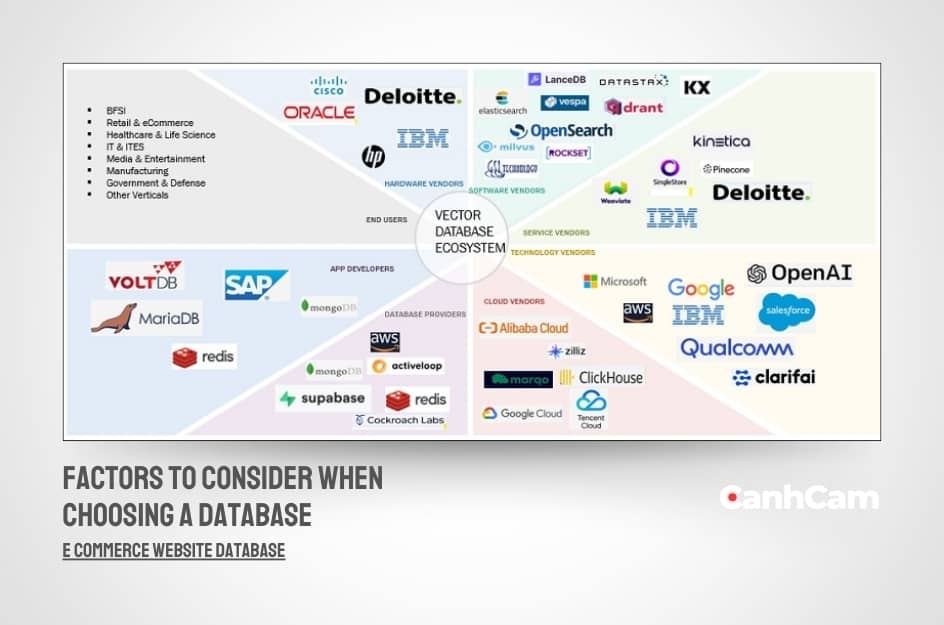Nowadays, with the emergence of ecommerce, the value of user-friendly ecommerce databases is evident. It is the core of each ecommerce platform. The emergence of the ecommerce sector nowadays creates a problem for businesses to organize, store, and getting data. Online business owners need to update their daily activities and take full charge of the entire supply chain.
The best means of tackling such problems for ecommerce stores is the ecommerce database. In this blog, we will journey with you through why ecommerce databases are important, and you will see how a well-designed ecommerce database fits into your business structure.
Make a design or drawing to show how the various pieces of information, like products, customers, orders and inventories, are stored in the table. Can you picture yourself being the one to build a house but not using bricks and mortar but data for online stores?
What Is an Ecommerce Database Design?
The ecommerce database design or schema is the way the data of the ecommerce site is organized and structured to support its implementation. It involves table identification, relationships between tables, relationships among tables, data storage, and retrieval mechanisms to enhance system performance, reliability, and flexibility.
Ecommerce database design must also be aware of security, scalability, and compatibility with the system components like web applications and other supporting services.
Visit Our Service: Web Design Services Melbourne

The Importance of a Database for Your Ecommerce Store
Every success starts with a well-designed database. The significance of the database in ecommerce cannot be underestimated. This is where the critical store data is stored, managed, and queried thereby, making it an integral part of any ecommerce application. An efficient database is one, that ensures store performance, reliability and high scalability directly impacting customer satisfaction, sales volumes and revenue generation.
- Performance: A desirable database will ensure that the e-commerce store processes the data effectively and quickly enough, thus promoting faster page loading and transaction processing times. It further helps customers to overcome barriers and achieve better sales and conversion rates.
- Scalability: With the growing size of your e-commerce store, so will the data volume. A database of the correct size will scale according to this growth, allowing you to continue providing a good user experience even as your business increases in size.
- Reliability: An efficient database guarantees data integrity and safeguards data loss, which are the two pillars for e-commerce stores to obtain customers' trust and run smoothly.
- Data-driven decision-making: A structured and arranged database will transform your business data into detailed data that is easy to analyze. This will help your business make better decisions and optimize e-commerce processes.
Read our blog: Ecommerce Web Hosting: Guide to Choose the Best eCommerce Hosting
Popular Database Choices for E-commerce
Different databases can be used for ecommerce stores, but some are more widely used and suitable for the needs and requirements of the online retail environment. Below are some popular database choices for e-commerce applications:
MySQL
An open-source relational database management system, MySQL, presents many advantages in terms of speed and scalability. Therefore, it is often a good choice as a backend for ecommerce websites with many products and customers. Most large e-commerce sites such as WooCommerce, Magento, and OpenCart are based on MySQL.
PostgreSQL
PostgreSQL is another open-source relational database system that provides advanced features including scalability and strict compliance with SQL standards. PostgreSQL may not be as popular as MySQL, but it still offers good speed and functionality. For this reason, ecommerce stores with complex data requirements can use it as an alternative.
MongoDB
MongoDB is a widespread NoSQL database that involves a scheme-less method approach only. In contrast, MongoDB is known for its flexibility and can easily manage different types of unstructured data commonly found in e-commerce applications. MongoDB's robust architecture and scalability make it an excellent option for stores with a high level of visitors.

Cassandra
Apache Cassandra is a distributed and highly scalable NoSQL database meant to cater to massive amounts of data across multiple nodes. The architecture of Cassandra enables excellent fault tolerance and availability, which will be of great use for global e-store applications that require low latency and continuous operation.
Relational Databases vs. NoSQL Databases
Relational Databases
Relational database management systems such as MySQL and PostgreSQL are organized in a table based on a particular schema. This is possible because they use SQL language, which is specially designed for querying data. SQL allows queries of various complexity such as filtering, joining and grouping data from different tables.
- ACID compliance: Relational databases show the ACID transactions property which includes the atomic, consistent, isolated, and durable properties. Thus, this ensures data consistency during the data recovery process even in case of any system failure.
- Enforced schema: Data validation and correct performance are the security guards of the data table, which provide a specific set of rules for the data to be kept, stored and maintained.
- Join and aggregation: The functionalities that relational databases have on executing complex queries result in easy aggregation of data together with the ability to construct join queries that are related, thus, relationships and trends within the data can be visualized.
Relational databases are originally designed for the e-commerce platform which is used when data is structured and complex queries are processed along with the data integrity procedure.
NoSQL Databases
The NoSQL databases like MongoDB and Cassandra are geared towards unstructured data handling and offer a lot of advantages to the data storage and retrieval process. However, the scheme-free approach of NoSQL provides for various data types and different storage formats.
- Horizontal scalability: NoSQL databases are designed to be horizontally scalable, so assigning new nodes or clusters to handle an increasing data volume and workload becomes effortless, a property that makes them suited to be used in highly demanding data-intensive applications.
- Flexible data model: Schema-less approach to NoSQL databases means that the data representation model can be a very flexible one. Therefore, data management of many different data formats that is commonly used in e-commerce applications become simpler.
- High availability and fault tolerance: Data replication along with node failure tolerance assured by partitioning as an inbuilt property is the key feature of many of the NoSQL databases.
NoSQL databases will be useful to e-commerce stores that deal with unstructured or heterogeneous data and require high availability and scalability to support varying workloads and traffic volumes.
It is vital to acknowledge the strengths and weaknesses of both relational and NoSQL databases when deciding on the most appropriate database for your ecommerce store. Consider your needs, data requirements, and development plans for your specific application to make informed decisions that best support your store's success.
Factors to Consider When Choosing a Database:
Scalability
Internet stores may face considerable growth in the number of their customers and traffic. Hence, the basis of your databases should be scalability, which allows you to cover more users and transactions. While selecting a database, note the feasibility of scaling both vertically (adding more resources to the current system) and horizontally (increasing the number of nodes in a distributed system).
Performance
The database's effectiveness is the crucial contributing factor in the performance of your ecommerce store, including the high period. In this case, you should prefer databases that feature fast read and write operations, more than complex queries, and optimal performance under high loads.
Data Integrity
Data integrity is a top priority in e-commerce, where valuable customer information and financial operations take place. Determine how the database meets the ACID properties (Atomicity, Consistency, Isolation, Durability) and how the integrity of data is maintained during a transaction.
Query Complexity
The search engines for the e-commerce platforms are usually complex queries that require filtering, sorting, and displaying of the products as well as business rules. You should take care to choose a database that supports the types of queries your e-commerce store requires and can manage complex queries without any performance issues.

Data Type
The type of data that will be collected is stored by the ecommerce platform determines the kind of database solution. An instance of this would be that a relational database will be better suited to structure data while a NoSQL database will be more effective for unstructured data such as pictures and text.
Data Security
As ecommerce sites collect sensitive customer information like credit card details and personal information, the database should have highly secure features to ensure security. Study the security features of every choice, including data encryption, user authentication, and access control, to ensure that customer information is protected. By highlighting the different merits that different databases have, you can make an intelligent choice that best suits your ecommerce store, thus fulfilling your business needs and attaining your objectives.
To Sum Up
To conclude, the choice of the database design for an ecommerce website is a very important milestone of the creation process of the platform that can substantially influence the performance, scalability, as well as success of the application. Through assessing elements like data structure, scalability, flexibility, and performance features, businesses have an informed option to select the most accurate databases to match their operations and objectives.
Selecting from MySQL, PostgreSQL, MongoDB and Cassandra among other choices, you are sure to find a specialized database offering storage, retrieval and management at a high level that will deliver a smooth and management at a high level that will deliver a smooth user experience. Alongside this, ever-present tuning, optimization and improvements to the design are necessary to help the database adapt to the challenges of changes the system may experience.
Let’s cut straight to the chase. Availing a purposefully crafted and structured database layout supports sales operations that are on top of their game, they can deliver with accuracy while giving customers personalized attention. In the long run, this fuels growth for the business.

